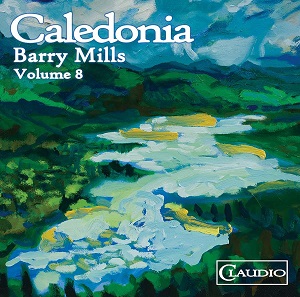
Barry Mills (b.1949)
Volume 8 – Caledonia
Four Places in Tenerife (1998)
Caledonia (2018)
Trumpet Concerto (2019)
Swords into Ploughshares (2017)
Nathaniel Mander (harpsichord), Imogen Whitehead (trumpet/flügelhorn), Esther Ward-Caddle (cello)
Moravian Philharmonic Orchestra/Pavel Šnajdr
rec. 2020-21, Czech Republic
Claudio CC6051-2 [77]
Over the last decade, Claudio has been industriously recording and issuing music by Barry Mills. Mills’ Sussex University studies during the 1970s saw his professional affections shift from biochemistry to music. A dedicated composer, he now alternates the writing of music with concerts in and around Brighton. This Claudio CD introduces four orchestral works written during the two decades from 1998.
Four Places in Tenerife [13:02] is, in effect, a travelogue in four movements but heard here in a single track. The movements are: The sea at Sauzal, Las Rosquillas botanical gardens, Orotava Valley and Evening in Puerto de la Cruz. The music at first shivers and shimmers, but there’s a disquiet too, despite a very open and ozone-rich sound. There is also a Ravel-like delicacy about this, which contrasts with some more violent rolling gestures from brass at 7:05 and 8:50. The composer seems to be underscoring for us that this is not a calm sea and prosperous voyage. There’s a modicum of placid contentment, but this calm atmosphere is hinted at rather than frankly stated. The finale is no wild feria, but it’s lively enough. Mills here proves to be a subtle artist of textures and gestural figures.
Caledonia [23:38] was written for Nathaniel Mander. It is in three movements with poetic allusive titles: Ripples on the surface of the loch, Highland Rain, Moorland Mist. The music is much preoccupied with shadows and there’s just a hint of a shiver and a shudder. Little gusts of wind stir the surface and the woodwind is much in evidence. Other experiences across the three movements include sheeny string writing juxtaposed with timpani and subtle ‘tizzing’ clashes from the cymbal. There’s then more lyrical sighing from some very cool woodwind and the tempo is deliciously slow – idyllic. This is music largely untroubled but with the mists and the occasional rill amid the placidly shimmering waters. The experience is one of disquiet honed by string motifs in constant motion amid the mist.
The Trumpet (doubling flügelhorn) Concerto of 2019 is, unusually enough, in five short movements. It’s less of a strutting peacock-display than a series of poetic sketches with trumpet. To further underline the divorce from the usual pattern of such works, each movement carries a title. Sea Moods is calmly evocative and is more uniform (despite the liner essay) than the variety suggested by ‘moods’. In the second movement I’ll love my love, Mills’ sighing writing is favoured again with the harp in the foreground and with the song itself played at first with loving fragility and then full-lipped. After Windswept (III) and its shudders there comes Evening (IV) with, as we are told, Mills’ Homage to Miles Davis. The trumpet’s oratory glides high over the suggestion of a secret sadness. This yields ground to more pungent nostalgia in the finale, which is called Looking Back.
Swords into Ploughshares is the title of the final orchestral sequence here. It was written for the cellist Esther Ward-Caddle, a pupil of Christopher Bunting. She plays in ensembles in Brighton and its catchment. It was there that she met Mills. It is Ward-Caddle who plays on this recording. The five parts, or movements, are: I. This peaceful Morning, II. Partings, III. Conflict, IV. Lamentation and V. Imagine. The first of these is very English in its long lyrical, rhapsodic and appealing paragraphs. Partings is borne aloft by the folksong The Banks of the Nile played by solo cello. Other 19th century folksongs – relics of the American Civil and Napoleonic wars – weave their path through the remainder of the movement. In Conflict, panic seems to be in the air with what I hear as images of malign creatures in flight. It’s the stuff of nightmares and a departure from much of what is on this disc. Lamentation returns to Mills’ accustomed, deeply-rooted sadness woven with desolation populated by memories. Balm is waiting in the wings with Imagine (V) and its message of sorrow and peace-suffused future. In its subject matter, if not its substance, this reminds us of Gerald Finzi’s A Farewell to Arms.
Of his other works, Barry Mills’ orchestral piece Tartano (1997), which we can hope to hear eventually, was given its first performance by the same Moravian Philharmonic Orchestra but there conducted by Jiří Mikula. This was recorded for the Vienna Modern Masters CD series. I do hope that it can be ingathered and reissued by Claudio. I know from their valued efforts for Anthony’s Milner‘s and Alan Bush‘s orchestral works – originally recorded by Hyperion and issued only on LP – that they are not averse to such things.
For the present disc Barry Mills contributes the booklet notes and Geoff Hands is the artist whose paintings adorn the cover. Mills has set out systematically to make his works easily available via videos on his website.
This quietly un-glossy music projects integrity and recalls that of John Jeffreys, an English composer whose style is related to that of Robin Milford: undemonstrative and understated. Here is a composer who is not going to seize you flamboyantly by the throat but who modestly enchants. In Tolkien terms, the parallels are with a Radagast and not a Mithrandir.
Rob Barnett
Help us financially by purchasing from




















